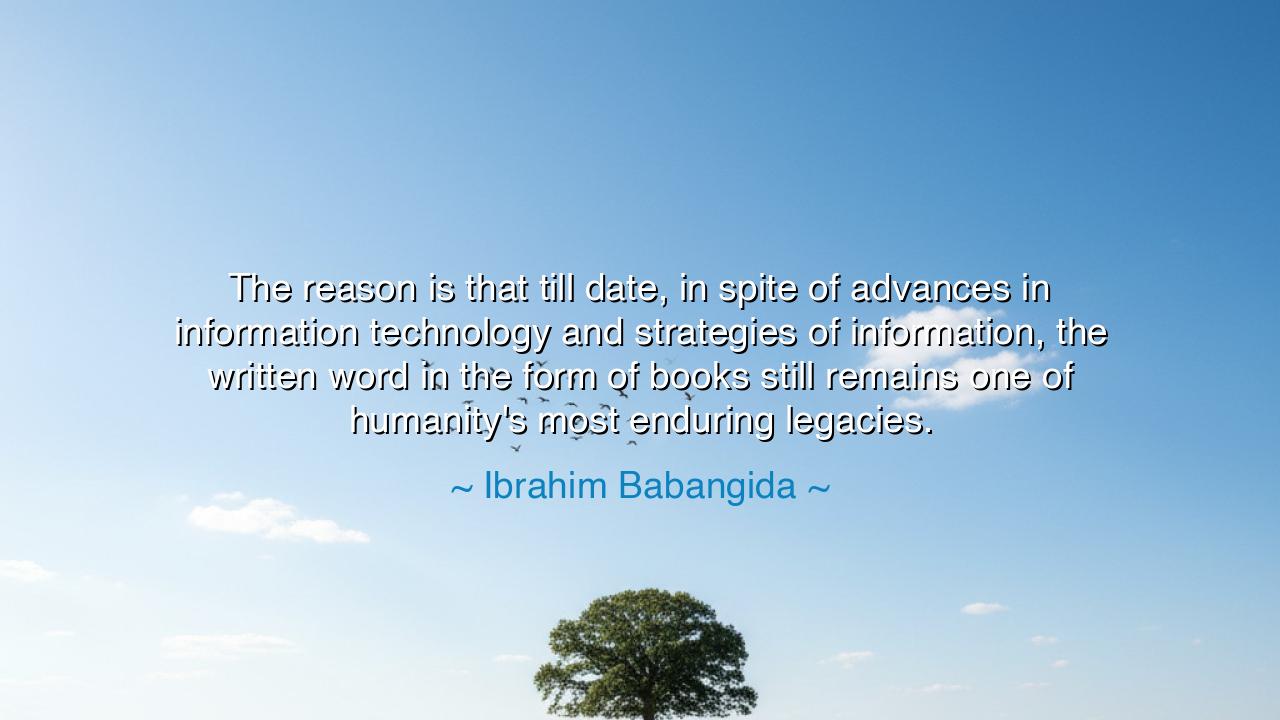
The reason is that till date, in spite of advances in
The reason is that till date, in spite of advances in information technology and strategies of information, the written word in the form of books still remains one of humanity's most enduring legacies.






Ibrahim Babangida, a man of state and reflection, once proclaimed: “The reason is that till date, in spite of advances in information technology and strategies of information, the written word in the form of books still remains one of humanity's most enduring legacies.” In these words lies a truth so ancient and yet so alive: that while the world rushes forward with machines and glowing screens, the book still stands as a monument, bridging past and future, carrying the wisdom of the ages in its quiet, steadfast form.
The meaning of his words is first found in the eternal power of the written word. Empires have risen and fallen, technologies have been born and forgotten, yet the book endures. Clay tablets of Mesopotamia still speak across five thousand years, the papyrus scrolls of Egypt whisper still, and the codices of monks yet sing with the words of prophets and philosophers. What invention of our modern age can rival such endurance? Babangida reminds us that no matter how vast the internet grows, no matter how swift information travels, humanity’s truest treasure remains the recorded word, etched in permanence.
The book is more than information—it is memory, it is testimony, it is the voice of the dead speaking into the ears of the living. Technologies come dressed in novelty but fade as swiftly as fashions: the floppy disk, the reel-to-reel, the pager, the VHS—all once mighty, now forgotten. Yet Homer's Iliad, copied and preserved in countless manuscripts, still stirs the hearts of warriors and poets. The works of Shakespeare, once printed on fragile paper, still echo upon stages across the globe. These examples prove Babangida’s insight: the written word has a resilience that no ephemeral technology has yet surpassed.
Consider the fall of the Library of Alexandria, where countless scrolls perished in fire. Though the knowledge there seemed lost, much of what humanity valued survived because it was scattered in books, copied again and again by scribes across lands and centuries. Without these written witnesses, the wisdom of Aristotle, Plato, and countless others might have vanished into silence. Here we see why Babangida calls the book a legacy—for it is not simply a vessel of words, but a torch, carried forward so that light may pass from age to age.
His words also remind us that advances in information technology, though powerful, cannot replace the intimacy and permanence of books. A digital file may vanish with the crash of a server; a website may disappear overnight. But a book in hand, printed and preserved, needs no electricity, no code, no machine. It is a companion in solitude, a teacher in silence, a testament against the erasure of time. The ancients who carved words into stone perhaps foresaw this: that only what is written endures beyond the frailty of memory.
Yet, Babangida does not scorn technology—he merely warns us not to be deceived. The new must serve alongside the old, not destroy it. For even now, information technology thrives by digitizing the written word, proving that books remain the foundation upon which the digital rests. Without books, the internet would be a hollow stream; without written archives, knowledge would dissolve into rumor. Thus, the book remains the root, while technology is but the branching tree.
The lesson for us is clear: honor the book as the guardian of humanity’s spirit. Do not abandon it in the rush of new devices; do not neglect it amidst the glitter of screens. Keep books in your homes, give them to your children, and return to them for wisdom and comfort. For in the book lies not only knowledge, but the very soul of humanity, preserved for generations yet unborn. And when the new technologies of today are forgotten, it is the written word that will remain, steadfast and eternal, the true legacy of mankind.






AAdministratorAdministrator
Welcome, honored guests. Please leave a comment, we will respond soon